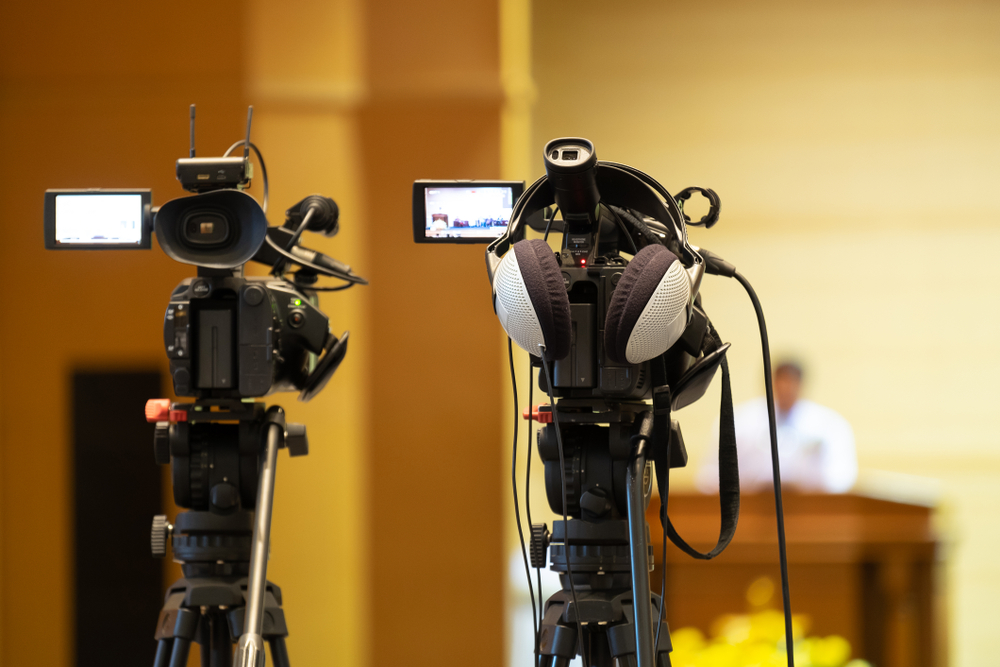The Relevance of Lawful Video Clip Depositions in Modern Legal Providers: What You Must Know
Lawful video depositions have ended up being crucial in today's legal landscape. They supply a multidimensional sight of witness testimonies that typical records just can not match. By recording both verbal and non-verbal interaction, these depositions enhance the total understanding of a witness's reputation. However, the efficiency of video clip depositions depends upon different aspects, including compliance with lawful requirements and finest practices (legal video depositions). Checking out these elements exposes their true importance in modern-day legal solutions
What Are Legal Video Depositions?
Lawful video depositions act as a crucial tool in the litigation procedure. They entail tape-recording witness testaments in a video layout, recording both verbal and non-verbal interaction. This method enables lawyers to record the disposition, expressions, and responses of witnesses, supplying a richer context for the statement. Generally performed in a regulated setting, these depositions are led by attorneys that ask inquiries while a stenotype reporter records the dialogue. The resulting video can be important for test prep work, as it makes it possible for legal representatives to assess the integrity of witnesses and improve their methods. In addition, lawful video clip depositions can be made use of in various legal contexts, ranging from civil disputes to criminal cases. The visual and auditory elements of video depositions boost the discussion of proof, making it an essential component in the modern legal landscape. Overall, they contribute considerably to the performance and performance of lawful process.

Benefits of Video Clip Depositions Over Standard Techniques
Video clip depositions supply countless benefits contrasted to typical approaches of taking witness testaments. One substantial advantage is the capability to catch both aesthetic and audio components, offering an extra comprehensive document of the witness's statements. This twin layout boosts clarity and allows attorneys to reference details subtleties throughout trial preparation. Furthermore, video clip depositions promote remote engagement, making it much easier for witnesses that might be not available for in-person appearances due to geographical restraints or health issues.Moreover, video clip depositions can quicken the general deposition procedure, reducing the moment and prices connected with travel and logistics. They additionally enhance access, as taped depositions can be easily shared among legal teams and referenced at any moment. This convenience adds to far better situation management and preparation. Overall, video clip depositions represent a modern-day, effective strategy to gathering witness testaments, lining up with the evolving requirements of the lawful career.
The Function of Body Language and Tone in Testimonies

In legal video clip depositions, body movement and tone play essential roles in conveying a witness's credibility and dependability. Nonverbal cues can offer understandings into a witness's emotion, influencing exactly how their testament is perceived. Comprehending the effect of these components is necessary for attorneys and jurors alike when evaluating the dependability of a statement.
Nonverbal Communication Insights
While verbal interaction is usually emphasized in legal testimonies, nonverbal hints such as body language and tone play a necessary duty in conveying integrity and emotion. Onlookers of depositions may note that a witness's stance, motions, and faces can substantially affect perceptions of reliability. For example, constant eye contact might signify self-confidence, while preventing stare can suggest deceit or pain. The tone of voice-- its quantity, speed, and pitch-- can impart sensations of sincerity or uncertainty. Lawyers need to be attuned to these nonverbal signals, as they frequently give essential context that matches spoken words. Understanding these nuances can boost the efficiency of depositions and influence the end result of lawful process.
Emotional Tone Effect
The psychological tone conveyed during lawful testaments considerably affects just how a witness is viewed. Body movement, vocal inflections, and face expressions play crucial functions fit the narrative of a testament. A witness displaying self-confidence with constant eye get in touch with and a tranquil tone can impart a feeling of dependability and engagement. On the other hand, signs of anxiousness, such as fidgeting or a shaky voice, might cause hesitation regarding their account. The subtleties of emotional expression can affect the interpretation of facts, making it vital for attorneys to recognize these cues. In video depositions, the aesthetic and auditory parts integrate, stressing the importance of emotional tone in communicating genuineness and truthfulness within the legal procedure.
Credibility and Reliability
An important consider establishing integrity and trustworthiness during statements lies in the witness's body language and tone of voice. Onlookers commonly count on non-verbal cues-- such as eye get in touch with, position, and motions-- to analyze a witness's sincerity. A witness who maintains eye get in touch with and displays open body language may be perceived as more trustworthy and honest than one who prevents eye get in touch with or shows up closed off. Furthermore, tone of voice plays a vital function; a stable, calm tone can enhance the reputation of the testament, while changes in pitch or volume may elevate uncertainties. Eventually, the combination of body language and singing tone greatly affects exactly how a witness's statements are obtained and analyzed in a legal context.
Best Practices for Carrying Out Video Depositions
Performing video clip depositions needs cautious planning and implementation to ensure a clear and effective presentation of testimony. Initially, it is crucial to choose a silent, well-lit place to minimize disturbances and safe optimal video clip high quality. The devices needs to be checked beforehand, including cameras, microphones, and lights, to prevent technological issues throughout the deposition.Next, events included have to evaluate the layout and procedures in advance, seeing to it that everybody understands their duties. The deponent should be oriented on the process, including just how to respond plainly and concisely.Additionally, preserving a specialist disposition throughout the session is crucial. This includes avoiding speaking over one another and validating that all inquiries are guided appropriately. Lastly, it is vital to record the deposition in a style that permits very easy playback and review, protecting the honesty of the testimony for future usage.
Legal Considerations and Compliance Issues
Just how do lawful factors to consider and compliance problems influence the efficiency of video clip depositions? Lawyers should navigate a complicated landscape of laws, making certain that video depositions abide by administrative regulations and requirements. Conformity with legislations worrying personal privacy, consent, and tape-recording techniques is important. Obtaining specific approval from all celebrations involved is necessary to stay clear of lawful repercussions.Additionally, the admissibility of video clip evidence in court can pivot on conformity with procedural requirements. Making certain that the devices used meets technological criteria is likewise important, as bad quality can undermine the deposition's reliability.Moreover, lawyers should be aware of any type of specific state regulations that regulate video clip depositions, as these can differ considerably. Failing to attend to these factors to consider can not only endanger the stability of the deposition however additionally affect the total situation technique, inevitably influencing the client's legal end results.
Just How Video Clip Depositions Effect Jury Assumption
While video clip depositions can act as powerful devices in legal proceedings, their influence on court assumption is substantial. The visual and auditory elements of video clip recordings provide jurors with a much more comprehensive understanding of witness temperament, reputation, and emotional actions. This multimedia approach can improve the jurors' capacity to evaluate the integrity of testimony compared to standard text-based transcripts.Moreover, video clip depositions allow jurors to observe body language, intonation, and faces, all of which can impact their analysis of the witness's declarations. The presence of a witness on screen can humanize them, promoting empathy and link, which may sway jurors' viewpoints. Alternatively, a witness who shows up untrustworthy or evasive on video might bring about adverse perceptions that influence a jury's decision. Eventually, the vibrant nature of video clip depositions plays an essential role in shaping how jurors translate evidence and reach their decisions.
The Future of Video Depositions in Legal Method
As innovations in modern technology remain to improve the lawful landscape, the future of video clip depositions is positioned for considerable development. Advancements such as artificial intelligence, online truth, and improved video conferencing tools are expected to streamline the deposition procedure and boost ease of access. Lawful professionals might make use of AI-driven analytics to analyze witness reliability and situation toughness much more effectively.Moreover, the combination of digital reality might permit courts to experience immersive simulations of depositions, offering deeper context and understanding. Furthermore, the pattern towards remote have a peek at this website depositions is most likely to continue, using higher versatility for customers and attorneys alike.As remote work comes to be increasingly normalized, video depositions will likely become basic practice, reducing prices and time restrictions connected with traditional approaches. click site Generally, these technological developments promise to enhance the performance, efficiency, and accessibility of video clip depositions in legal practice, inevitably transforming exactly how attorneys plan for trial.
Frequently Asked Inquiries
Just How Much Do Legal Video Depositions Typically Price?

Can Video Clip Depositions Be Used in Any Kind Of Kind Of Case?
Video clip depositions can be utilized in numerous kinds of cases, consisting of civil, criminal, and household law. Their versatility allows attorneys to present witness statements successfully, adapting to the particular requirements of different lawful scenarios.
What Equipment Is Needed for a Video Deposition?
To perform a video clip deposition, important tools includes a premium camera, microphone, lights, and a trusted recording device. Additionally, a computer system with modifying software application might be required for post-production and formatting the final video.
How much time Does a Common Video Clip Deposition Last?
A typical video clip deposition lasts in between 2 to 4 hours, relying on the intricacy of the case and the number of questions presented. Extended sessions may take place, but breaks are normally integrated for individual convenience.

Are Video Clip Depositions Admissible in Court?
Video clip depositions are generally acceptable in court, provided they comply with legal standards and guidelines of evidence. Their usage enhances clarity and maintains witness testimony, assisting in the judicial process during hearings and tests. Lawful video clip depositions have come to be important in today's legal landscape. Furthermore, legal video depositions can be used in different lawful contexts, ranging from civil disputes to criminal instances. In addition, video clip depositions help with remote involvement, making it less complicated for witnesses who may be inaccessible for in-person appearances due to geographical constraints or health issues.Moreover, video clip depositions can expedite the general deposition process, lowering the time and costs associated with travel and logistics. Guaranteeing that the equipment used fulfills technical criteria is also crucial, as bad top quality can weaken the deposition's reliability.Moreover, attorneys have to be mindful of any type of certain state legislations that govern video clip depositions, as these can differ considerably. Additionally, the fad towards remote depositions is likely to linger, providing higher versatility for attorneys and customers alike.As remote work ends up being progressively normalized, video clip depositions will Home Page likely come to be common practice, decreasing prices and time restraints linked with traditional approaches.